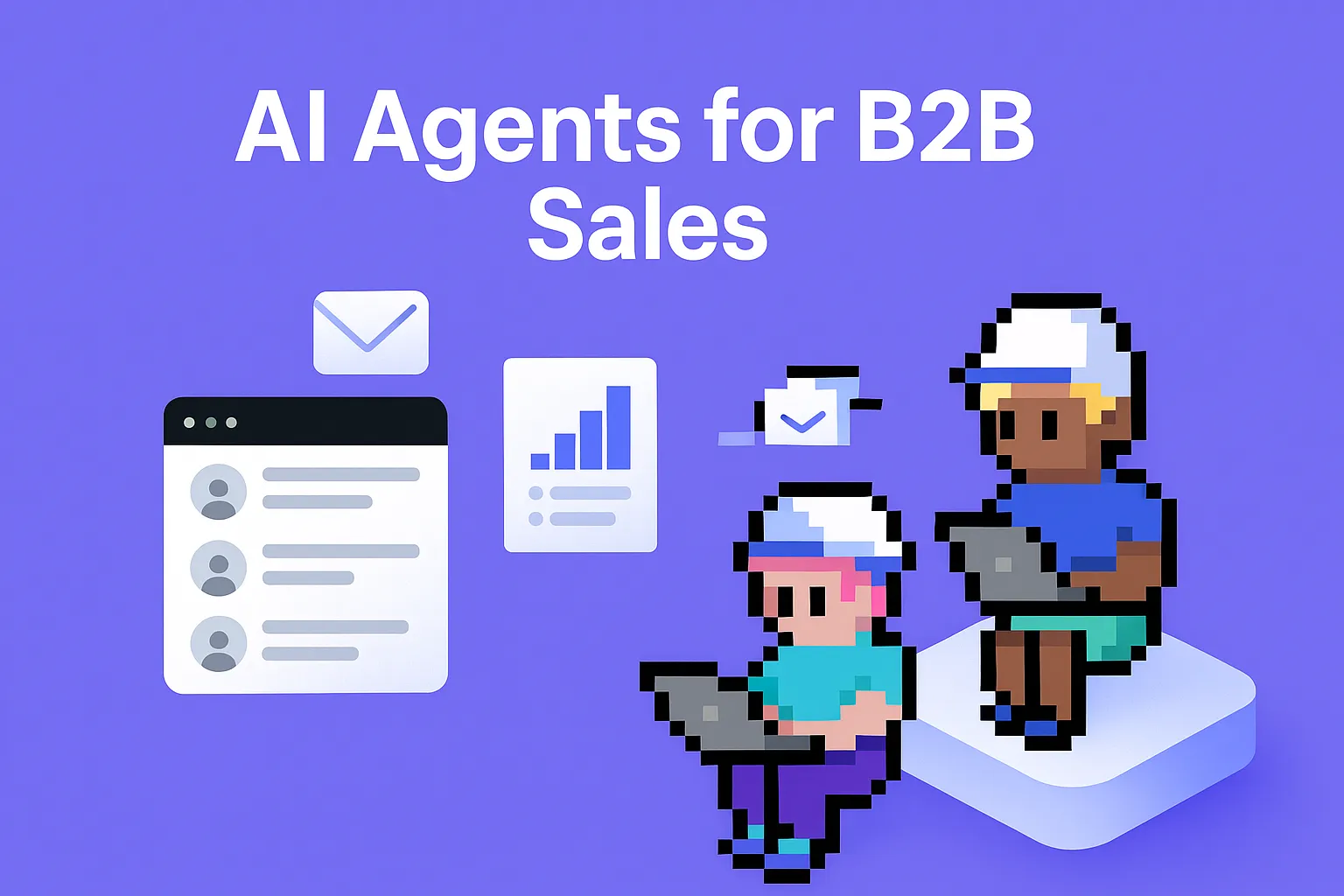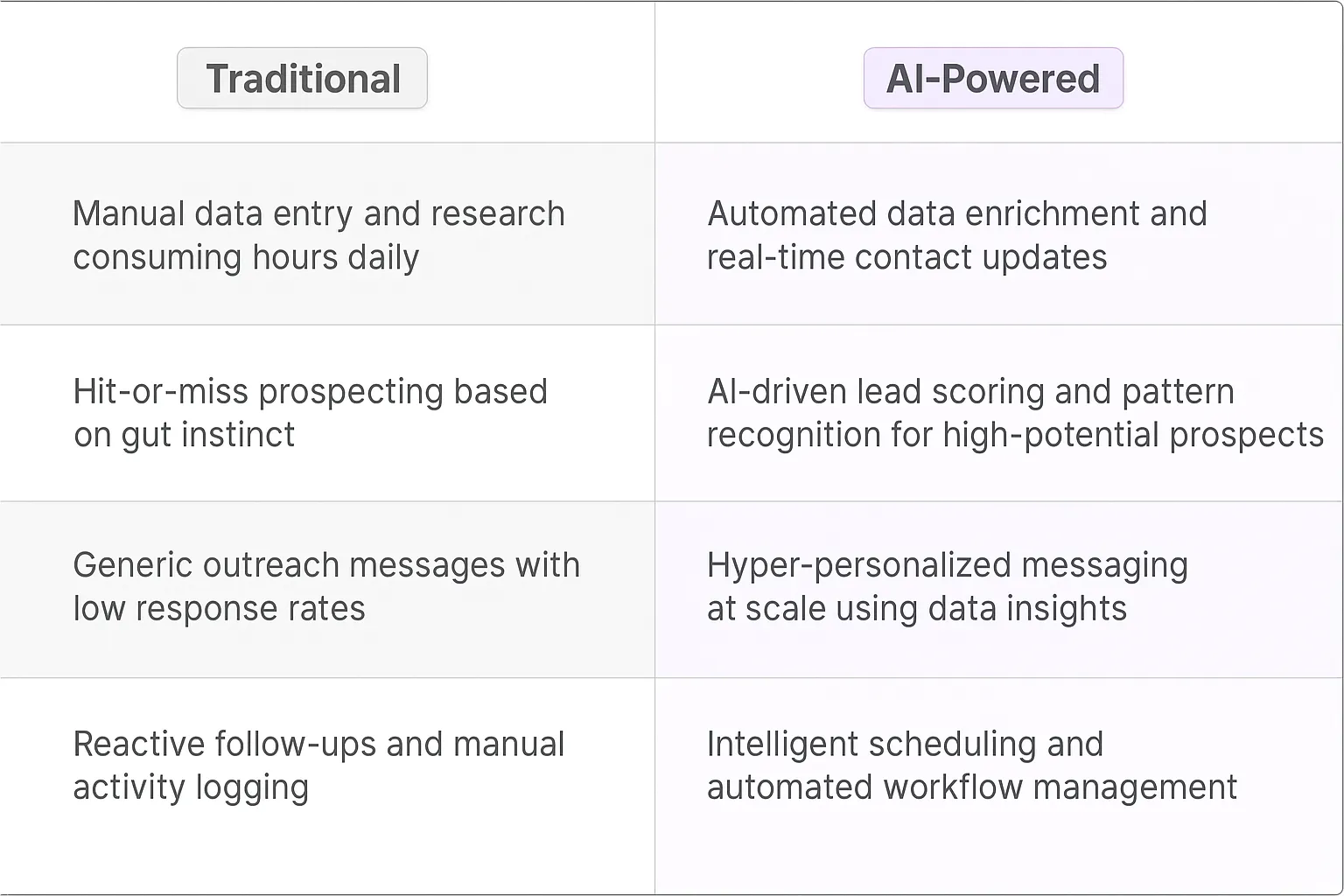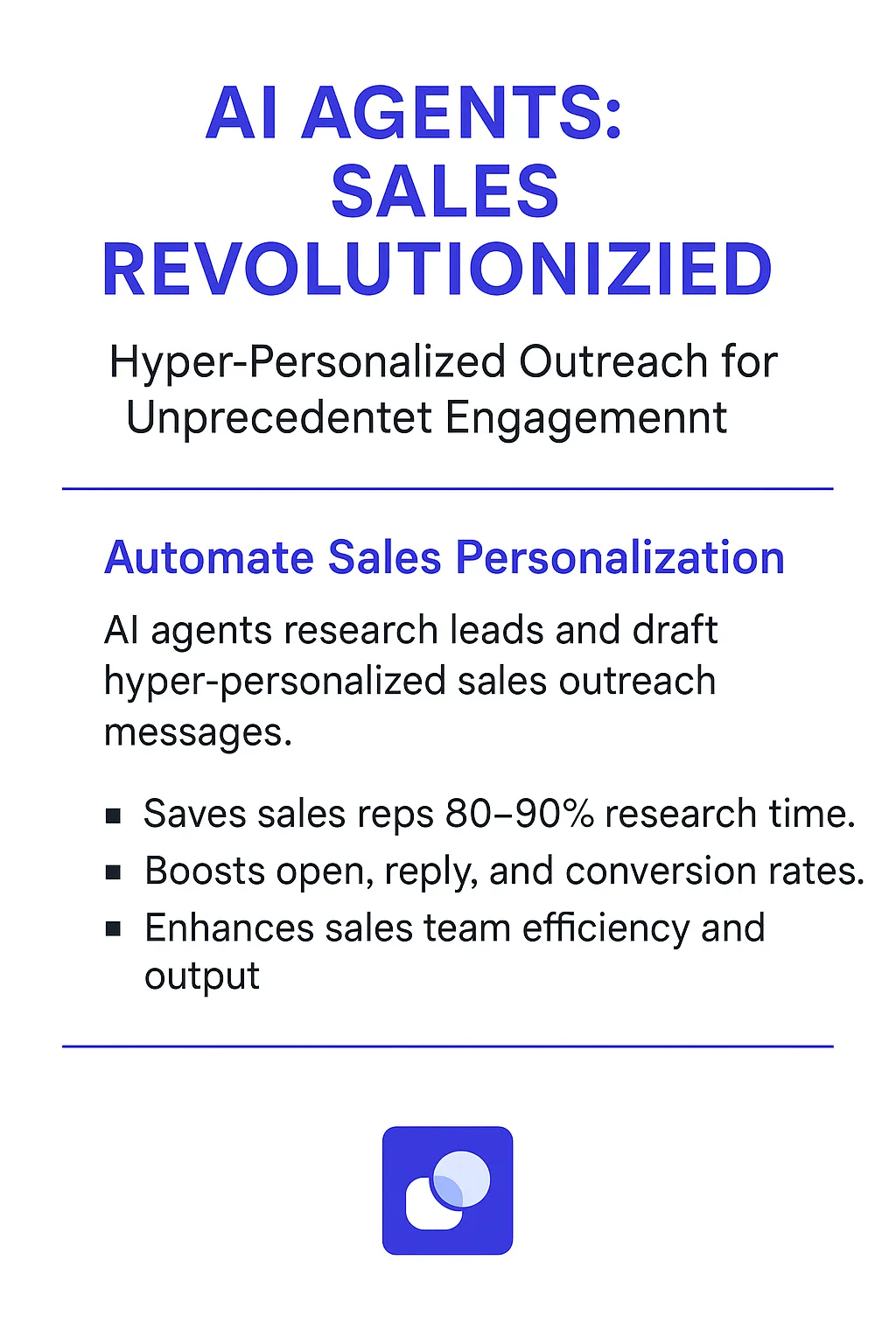Lusha AI Agents
Unveiling Lusha: A Revolutionary B2B Sales Intelligence Platform
What is Lusha?
Lusha is a cutting-edge sales intelligence platform that provides B2B sales professionals with accurate contact and company information. It's designed to help sales teams identify, connect with, and close deals with their ideal prospects more efficiently. By leveraging vast amounts of data and advanced algorithms, Lusha offers a comprehensive solution for modern sales challenges.
Key Features of Lusha
- Extensive B2B contact database with verified information
- Real-time data enrichment capabilities
- Integration with popular CRM systems and sales tools
- Advanced search and filtering options for targeted prospecting
- AI-powered lead scoring and prioritization
- Compliance with data privacy regulations like GDPR and CCPA

Benefits of AI Agents for Lusha
Let's dive into the world of Lusha and how AI agents are transforming the sales landscape. As someone who's been in the trenches of tech startups and venture capital, I've seen firsthand how the right tools can make or break a sales team's success.
What would have been used before AI Agents?
Before AI agents entered the scene, sales teams were stuck in a cycle of manual data entry, endless cold calls, and hit-or-miss prospecting. They'd spend hours scouring LinkedIn, company websites, and outdated databases, trying to piece together accurate contact information. It was like trying to solve a puzzle with half the pieces missing – frustrating and incredibly time-consuming.
Sales reps would often rely on gut instinct or surface-level research to prioritize leads, leading to wasted efforts on low-potential prospects. The process was inefficient, prone to human error, and left a lot of potential revenue on the table.
What are the benefits of AI Agents?
Now, with AI agents integrated into Lusha's platform, we're seeing a seismic shift in how sales teams operate. These digital teammates are like having a tireless, data-crunching sidekick that never sleeps and always has your back.
First off, AI agents are crushing it when it comes to data accuracy and enrichment. They're constantly scouring the web, updating contact information in real-time, and ensuring that sales reps are always working with the freshest, most reliable data. This means fewer bounced emails and more conversations with the right decision-makers.
But it's not just about having good data – it's about knowing what to do with it. AI agents are taking lead scoring to the next level. They're analyzing patterns across vast datasets, identifying the subtle signals that indicate a hot lead, and helping sales teams focus their energy where it matters most. It's like having a crystal ball that tells you which prospects are most likely to convert.
One of the most exciting benefits I'm seeing is in the realm of personalization at scale. AI agents are enabling sales reps to craft hyper-targeted outreach that resonates with each individual prospect. They're analyzing company news, social media activity, and industry trends to suggest talking points and personalized content that cuts through the noise and grabs attention.
And let's talk about productivity. AI agents are taking on the grunt work – scheduling follow-ups, logging activities, and even drafting initial outreach messages. This frees up sales reps to do what they do best: building relationships and closing deals. It's not about replacing human interaction; it's about amplifying it.
The result? Sales teams using Lusha with AI agents are seeing shorter sales cycles, higher conversion rates, and ultimately, more revenue. They're not just working harder; they're working smarter, with AI as their secret weapon.
In the end, AI agents in Lusha are doing more than just improving efficiency – they're fundamentally changing the game. They're turning sales from an art into a science, without losing the human touch that makes great salespeople irreplaceable. And for companies looking to stay ahead in today's competitive landscape, that's not just an advantage – it's a necessity.

Potential Use Cases of AI Agents with Lusha
Processes
Lusha's AI agent could revolutionize how sales teams approach lead generation and qualification. By tapping into Lusha's vast database of business contacts, the AI can automate the process of identifying high-potential leads based on specific criteria. It's like having a tireless digital teammate that's constantly scouring for the perfect prospects.
The AI could also enhance the account-based marketing (ABM) process. It would analyze company data, financial reports, and social media activity to build comprehensive profiles of target accounts. This deep dive into potential clients allows sales teams to craft hyper-personalized outreach strategies that resonate with decision-makers.
Tasks
On a granular level, Lusha's AI agent could tackle numerous tasks that typically eat up a salesperson's valuable time. For instance, it could automatically enrich CRM data by pulling in the latest contact information, job titles, and company details from Lusha's database. This ensures that sales teams always have the most up-to-date information at their fingertips.
The AI could also take on the task of initial outreach. By analyzing past successful email campaigns and combining that knowledge with Lusha's data on the prospect, it could craft personalized, attention-grabbing introductory emails. This isn't about spamming contacts - it's about using data intelligently to make meaningful connections.
Another potential task is lead scoring. The AI could analyze various data points from Lusha's database - such as company size, industry, recent funding rounds, or technology stack - to assign priority scores to leads. This allows sales teams to focus their energy on the prospects most likely to convert, maximizing efficiency and ROI.
The Andrew Chen Take on Lusha AI Agents
When we talk about AI in sales, we're not just looking at incremental improvements - we're talking about a fundamental shift in how sales teams operate. Lusha's AI agent isn't just a tool; it's a force multiplier that could dramatically amplify the effectiveness of every salesperson.
Think about the typical day of a sales rep. They're juggling prospecting, outreach, follow-ups, and trying to close deals. Now, imagine offloading a significant portion of that work to an AI that never sleeps, never gets tired, and can process vast amounts of data in seconds. That's the potential we're looking at with Lusha's AI agent.
But here's where it gets really interesting: this AI isn't just doing busywork. It's learning. With every interaction, every piece of data it processes, it's getting smarter. Over time, it could start to identify patterns and insights that even the most experienced sales reps might miss. We're talking about AI that doesn't just support sales teams, but actively contributes to sales strategy.
The real game-changer here is personalization at scale. In sales, the personal touch is everything. But how do you maintain that personal touch when you're dealing with hundreds or thousands of prospects? That's where Lusha's AI comes in. By leveraging Lusha's extensive database and combining it with machine learning capabilities, we could see a level of personalized outreach that was previously impossible at scale.
Of course, this isn't about replacing salespeople. It's about augmenting them. The best salespeople are creative, empathetic, and great at building relationships. The AI takes care of the data-heavy lifting, freeing up these talented individuals to focus on what they do best: connecting with people and closing deals.
In the end, Lusha's AI agent could be more than just a productivity tool. It could be the key to unlocking a new era of data-driven, hyper-personalized sales strategies. And in a world where the difference between success and failure often comes down to how well you know your customer, that's a game-changing proposition.

Industry Use Cases
The versatility of AI agents in Lusha makes them valuable across various industries. Let's dive into some meaty, industry-specific use cases that showcase how AI can transform workflows and processes. These aren't your run-of-the-mill examples - we're talking about real, tangible impacts that are reshaping how businesses operate.
From sales teams closing deals faster to recruiters finding that perfect candidate, Lusha's AI agents are like having a team of digital rockstars working 24/7. They're not just crunching numbers or automating tasks; they're uncovering insights, predicting trends, and making decisions that can give companies a serious edge.
So, buckle up. We're about to explore how these AI powerhouses are being put to work across different sectors, solving problems you might not have even realized existed. Trust me, by the end of this, you'll be seeing AI's potential in a whole new light.
Sales Prospecting in the SaaS Industry: Lusha AI's Game-Changing Potential
The SaaS industry is a battleground of innovation, and sales teams are constantly seeking an edge. Enter Lusha AI, a digital teammate that's about to flip the script on how we approach B2B sales prospecting.
Think about the typical day of a SaaS sales rep. They're juggling CRM data, LinkedIn profiles, and company websites, trying to piece together a coherent picture of their prospects. It's a time-sink that often yields mediocre results. Lusha AI changes this dynamic entirely.
By leveraging Lusha's vast database of business contacts and company information, the AI can autonomously build rich prospect profiles. But here's where it gets interesting: it doesn't just compile data; it analyzes patterns, identifies decision-makers, and even predicts the best time to reach out based on the prospect's online behavior.
Imagine a sales rep receiving a daily briefing from their Lusha AI teammate. It's not just a list of leads; it's a strategic roadmap. "Hey, the CFO of Company X just published an article about budget constraints. Here's a personalized pitch focusing on our cost-saving features." This level of insight turns cold calls into warm conversations.
But the real kicker? Lusha AI learns from every interaction. It observes which approaches work, which fall flat, and continuously refines its strategies. Over time, it becomes an invaluable repository of sales intelligence, specific to your company and your market.
This isn't just about saving time or increasing the number of calls made. It's about fundamentally changing the quality of each interaction. In a world where buyers are increasingly savvy and time-poor, this level of personalization and timing could be the difference between a closed deal and a missed opportunity.
The implications are profound. Sales teams can focus on high-value activities like relationship building and complex negotiations, while their AI teammate handles the heavy lifting of research and initial outreach. It's not about replacing the human touch; it's about amplifying it.
As we look to the future, the companies that effectively integrate AI tools like Lusha into their sales processes won't just be ahead of the curve – they'll be redefining what the curve looks like. The question isn't whether to adopt this technology, but how quickly you can integrate it before your competitors do.
Real Estate Market Disruption: Lusha AI's Next Frontier
The real estate industry is ripe for an AI-driven shakeup, and Lusha AI is poised to be the catalyst. Let's dive into how this digital teammate could transform the way real estate professionals operate and win deals.
Real estate has always been about relationships and information. But in an era where data is abundant yet insights are scarce, agents are drowning in noise. Lusha AI cuts through this chaos like a hot knife through butter.
Consider a real estate agent targeting commercial properties. Traditionally, they'd spend hours scouring public records, financial reports, and industry news to identify potential sellers or buyers. Lusha AI flips this model on its head.
By tapping into its vast network of business intelligence, Lusha AI can identify patterns that human agents might miss. It could flag companies that are expanding rapidly and likely need new office space, or spot businesses showing signs of financial strain that might be looking to offload properties.
But here's where it gets really interesting: Lusha AI doesn't just provide a list of leads. It creates a narrative around each opportunity. "Company Y just closed a Series C round and is hiring aggressively in the tech corridor. Based on their growth trajectory, they'll outgrow their current space in 8-12 months. Here's a personalized pitch highlighting properties that match their projected needs."
This level of insight turns cold calls into strategic conversations. Agents aren't just selling property; they're offering solutions to business problems that CEOs and CFOs might not even realize they have yet.
The AI's learning capability is a game-changer. Every interaction, every deal, every market shift becomes data that Lusha AI uses to refine its approach. Over time, it develops an uncanny ability to predict market trends and buyer behavior, giving agents a sixth sense for where the puck is going.
But let's be clear: this isn't about replacing real estate professionals. It's about elevating their role. With Lusha AI handling the grunt work of research and initial outreach, agents can focus on what humans do best: building relationships, negotiating complex deals, and providing the emotional intelligence that's crucial in high-stakes transactions.
The implications for the industry are profound. We're looking at a future where the most successful real estate professionals aren't necessarily those with the biggest rolodex, but those who can best leverage AI to identify opportunities and craft compelling narratives around them.
As we've seen in other industries, the early adopters of transformative tech often become the new market leaders. In real estate, those who embrace tools like Lusha AI won't just be closing more deals – they'll be redefining what it means to be a real estate professional in the 21st century.
The real estate game is changing. The question is: are you ready to play?
Considerations and Challenges in Implementing Lusha AI Agents
Integrating Lusha AI agents into your sales and lead generation processes isn't just a plug-and-play solution. It's a strategic move that requires careful planning and execution. Let's dive into the nitty-gritty of what you'll need to consider and the hurdles you might face.
Technical Challenges
First off, data integration is a beast. Lusha's AI needs to play nice with your existing CRM, marketing automation tools, and other sales tech stack components. This isn't just about API connections; it's about ensuring data flows seamlessly and accurately across systems. You might find yourself knee-deep in custom integration work, especially if you're running legacy systems or have unique data structures.
Then there's the data quality issue. Lusha's AI is only as good as the data it's fed. If your existing contact database is a mess of duplicates, outdated information, and inconsistent formats, you're setting yourself up for failure. A major data cleansing initiative might be necessary before you can even think about unleashing the AI.
Operational Challenges
On the operational front, you're looking at a significant shift in how your sales team works. Lusha's AI isn't just a tool; it's a digital teammate that will reshape workflows. This means retraining your team, not just on how to use the tool, but on how to interpret and act on the AI's insights. You'll need to foster a culture of AI-human collaboration, which is easier said than done.
There's also the question of metrics and KPIs. How do you measure the ROI of an AI agent? Traditional sales metrics might not capture the full value. You'll need to develop new ways to quantify improvements in lead quality, time saved, and conversion rates that can be directly attributed to the AI.
Ethical and Legal Considerations
Don't overlook the ethical implications. Lusha's AI is scraping and analyzing vast amounts of data to generate leads. You need to ensure you're on the right side of data privacy laws like GDPR and CCPA. This isn't just about compliance; it's about maintaining trust with your potential customers.
There's also the question of bias. AI systems can inadvertently perpetuate or even amplify biases present in their training data. You'll need to regularly audit the AI's output to ensure it's not leading your sales team down ethically questionable paths or missing out on potential markets due to hidden biases.
Scalability and Future-Proofing
Finally, think about scalability. Sure, Lusha's AI might work great for your current needs, but what happens when you expand into new markets or verticals? You need to ensure the system can grow with you, handling increased data volumes and adapting to new types of leads and sales processes.
And let's not forget about the pace of AI advancement. The Lusha AI you implement today might be outdated in a year. You'll need a strategy for staying current with updates and potentially even switching to more advanced systems as they become available.
Implementing Lusha AI agents is a complex undertaking that touches every aspect of your sales operations. It's not just about the technology; it's about reshaping your entire approach to lead generation and sales. But for those who navigate these challenges successfully, the potential rewards in terms of efficiency and effectiveness are enormous.
Embracing the Future of AI-Powered Sales
The integration of AI agents into Lusha's platform marks a pivotal moment in the evolution of sales technology. These digital teammates are not just enhancing efficiency; they're fundamentally reshaping how sales teams operate. By automating data-intensive tasks, providing deep insights, and enabling hyper-personalized outreach, Lusha's AI agents are giving sales professionals the tools to focus on what truly matters: building relationships and closing deals.
However, the journey to fully leveraging this technology is not without its challenges. From technical integration hurdles to ethical considerations and the need for cultural shifts within organizations, implementing Lusha's AI agents requires careful planning and execution. But for those who successfully navigate these challenges, the rewards are substantial: shorter sales cycles, higher conversion rates, and a competitive edge in an increasingly data-driven business landscape.
As we look to the future, it's clear that AI-powered sales tools like Lusha will play a crucial role in shaping the next generation of high-performing sales teams. The question isn't whether to adopt this technology, but how quickly and effectively companies can integrate it into their sales processes. Those who move swiftly and strategically in embracing Lusha's AI capabilities will likely find themselves at the forefront of a new era in sales – one where human intuition and AI-driven insights combine to create unprecedented levels of success.













